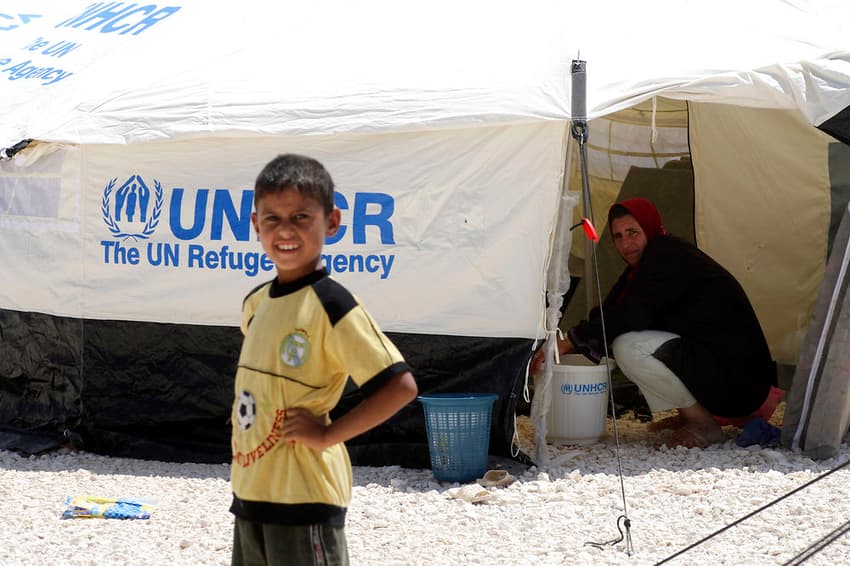'We’ll take quota refugees': Denmark to UN

Denmark is set to resume accepting refugees under the UN’s quota system after a three-year hiatus.
Minister for Immigration and Integration Mattias Tesfaye has informed the UN’s arm for refugees, UNHCR, that Denmark will take in refugees protected under the UNHCR quota system from this year.
“I informed (the UN on July 11th) that Denmark wishes to accept a small group of quota refugees who require special [medical, ed.] assistance from 2019,” Tesfaye told newspaper Politiken in a written message.
A number of steps are involved in the process of deciding which refugees will be taken in by Denmark, the minister said.
“It’s too early to say when the first quota refugees can be accepted, just as the exact number for 2019 is yet to be confirmed,” he said.
Previous annual numbers of UN quota refugees have been around 500.
The government decision on the issue was set out in the agreement reached between Tesfaye’s party, the Social Democrats, and three left-wing allied parties in the political agreement which followed the general election in June.
That deal enabled the Social Democrats to form a minority government as Denmark’s left won an overall majority in the election.
In addition to the group cited by Tesfaye, the immigration ministry has also informed UNHCR that it will accept general quota refugees from 2020.
Denmark first refused to take refugees from the UN’s quota system for resettlement from its UNHCR camps under the previous government in 2016, citing a need for "breathing space" to manage those already in the country. The policy was renewed annually up to and including last year.
The UNHCR’s North Europe spokesperson Caroline Bach praised the decision by the Danish government.
“With an increasing number of refugees who have a pressing need to be resettled, these gestures of solidarity are more important than ever,” Bach said according to Politken’s report.
The anti-immigration Danish People’s Party (DF) called the decision a "break of campaign promises" by the Social Democrats.
“We consider this a break of campaign promises made by the Social Democrats during the election to retain a strict immigration policy,” DF parliamentary group leader Peter Skaarup said.
READ ALSO: New Danish government to scrap plans for 'deserted island' deportation facility
Comments
See Also
Minister for Immigration and Integration Mattias Tesfaye has informed the UN’s arm for refugees, UNHCR, that Denmark will take in refugees protected under the UNHCR quota system from this year.
“I informed (the UN on July 11th) that Denmark wishes to accept a small group of quota refugees who require special [medical, ed.] assistance from 2019,” Tesfaye told newspaper Politiken in a written message.
A number of steps are involved in the process of deciding which refugees will be taken in by Denmark, the minister said.
“It’s too early to say when the first quota refugees can be accepted, just as the exact number for 2019 is yet to be confirmed,” he said.
Previous annual numbers of UN quota refugees have been around 500.
The government decision on the issue was set out in the agreement reached between Tesfaye’s party, the Social Democrats, and three left-wing allied parties in the political agreement which followed the general election in June.
That deal enabled the Social Democrats to form a minority government as Denmark’s left won an overall majority in the election.
In addition to the group cited by Tesfaye, the immigration ministry has also informed UNHCR that it will accept general quota refugees from 2020.
Denmark first refused to take refugees from the UN’s quota system for resettlement from its UNHCR camps under the previous government in 2016, citing a need for "breathing space" to manage those already in the country. The policy was renewed annually up to and including last year.
The UNHCR’s North Europe spokesperson Caroline Bach praised the decision by the Danish government.
“With an increasing number of refugees who have a pressing need to be resettled, these gestures of solidarity are more important than ever,” Bach said according to Politken’s report.
The anti-immigration Danish People’s Party (DF) called the decision a "break of campaign promises" by the Social Democrats.
“We consider this a break of campaign promises made by the Social Democrats during the election to retain a strict immigration policy,” DF parliamentary group leader Peter Skaarup said.
READ ALSO: New Danish government to scrap plans for 'deserted island' deportation facility
Join the conversation in our comments section below. Share your own views and experience and if you have a question or suggestion for our journalists then email us at [email protected].
Please keep comments civil, constructive and on topic – and make sure to read our terms of use before getting involved.
Please log in here to leave a comment.